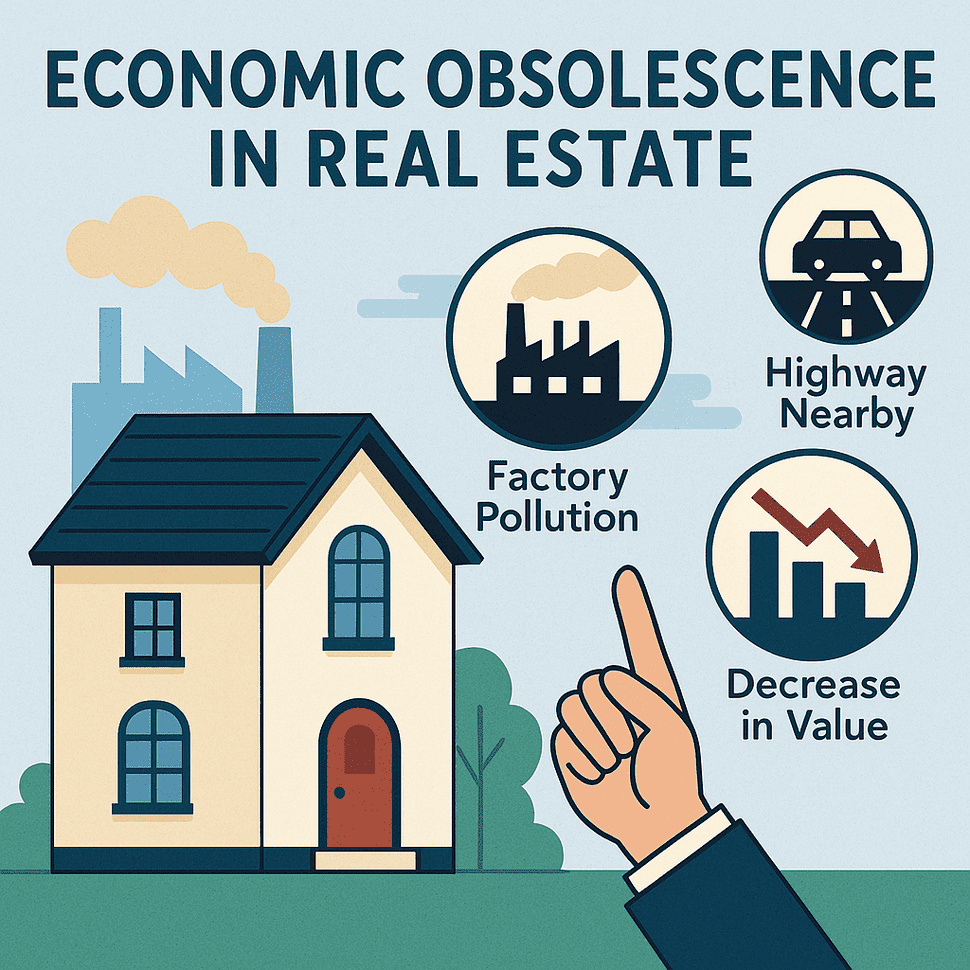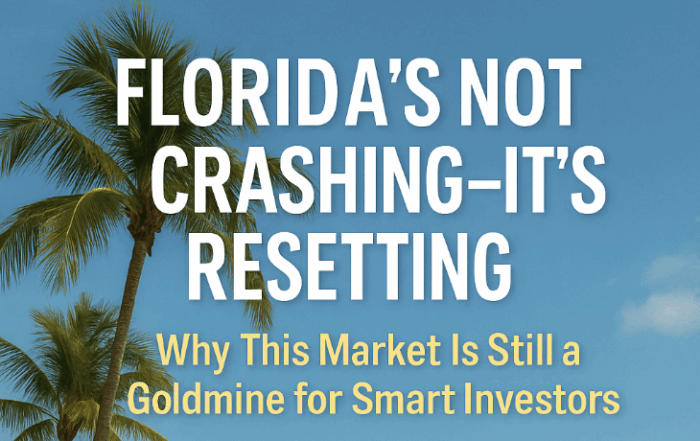
Economic Obsolescence in Real Estate: What It Is & How to Prepare for It Like a Pro
Focus Keyphrase: economic obsolescence real estate
SEO Title: How to Prepare for Economic Obsolescence in Real Estate (And Avoid Costly Mistakes)
Meta Description: Learn what economic obsolescence is and how to protect your real estate investment from value loss due to external factors. Real tips for smart investors.
Let’s talk about a sneaky little villain in the real estate world. It’s not foundation cracks. It’s not termites. It’s not even bad tenants (although we’ve all been there). It’s called economic obsolescence.
Sounds fancy, but here’s the deal:
Your property could be in perfect shape—great roof, updated kitchen, shiny floors—and still lose value because of what’s going on outside the house.
And here’s the kicker: you can’t fix it with a hammer or paintbrush.
As someone who owns over 30 properties and has done 3,500+ transactions, I’ve seen just about everything. While I haven’t had too many issues with economic obsolescence myself (only about 10% of my portfolio is short-term rentals), I’ve seen how it hits others—hard. So let me break it down, real-world investor style.
🌁 What Is Economic Obsolescence?
Economic obsolescence is when your property loses value due to external forces beyond your control. Think zoning changes, nearby crime spikes, noisy neighbors, or even the city deciding your quiet street needs a new overpass.
🏛 Examples:
-
A new highway opens and your cul-de-sac becomes a cut-through.
-
A local factory opens and brings pollution or noise.
-
A school district boundary shifts and your property’s no longer in the “good” zone.
-
Crime ticks up and the area becomes less desirable.
-
Your neighbor turns their house into a full-time party Airbnb.
None of that is your fault. But the value of your investment still drops.
🌿 Why It Matters for Investors
Whether you’re flipping, renting short-term, or holding for the long haul, economic obsolescence can sneak in and ruin your numbers.
✅ For Short-Term Rentals:
-
Market Saturation: Too many Airbnbs in one area = lower bookings and rates.
-
Regulations: Cities can suddenly ban or restrict STRs.
-
Neighborhood Backlash: Noise or party complaints might lead to HOA or city crackdowns.
✅ For Long-Term Rentals:
-
Declining areas mean fewer quality tenants and lower rents.
-
Crime or school zone changes can kill demand.
-
Negative perception is hard to shake, even if your unit is pristine.
✅ For Flips:
-
You buy, rehab, and then BAM—new development next door changes everything.
-
A rezoning or upcoming project lowers the pool of interested buyers.
-
You could lose time and profit trying to resell a now “less desirable” property.
Let me be clear: you can’t rehab your way out of this. You have to plan before you buy.
🔍 My “Don’t Get Blindsided” Checklist
Here’s how I evaluate deals to protect myself from economic obsolescence:
1. Check City and County Development Plans
-
Are they planning a highway, airport, or landfill nearby?
-
Any big rezoning in the works?
-
Ask for future land-use maps—they’re public info.
2. Study the Competition (Especially STRs)
-
How many short-term rentals are in a 1-mile radius?
-
Use tools like AirDNA or even Airbnb/Zillow.
-
Are nightly rates dropping? That’s a red flag.
3. Talk to the Neighbors
-
Anyone having issues with noise, crime, or traffic?
-
What do they think about the area in 5 years?
4. Look at Crime Trends and School Ratings
-
Even small changes affect tenant quality and resale appeal.
-
I review these every quarter for my rentals.
5. Check for Recent Zoning Changes or Restrictions
-
Especially for flips or STRs, zoning is everything.
-
One change can mean you can’t rent or flip how you planned.
⚡ The “What If” Test: Can You Pivot?
Let’s say you buy a rental that gets hit by a new city ordinance or unexpected development.
Ask yourself:
-
Can I switch it from STR to long-term rental?
-
Could I hold it longer and refinance?
-
Is it still rentable in a worst-case scenario?
If there’s no exit plan, it’s not a deal. Period.
⚖️ How to Stay Ready (Even After You Buy)
Even if you already own a property, you can still protect it:
✅ Keep Reserves
I always set aside 3–6 months of reserves, especially for my STRs. If revenue drops, I can ride it out.
✅ Stay Politically Aware
Follow local ordinances and zoning meetings. STR bans don’t come from nowhere.
✅ Maintain Flexibility
Keep your units rentable for both short- and long-term tenants.
✅ Create Unique Value
Private entrances, extra parking, ADUs—these things hold value even in shaky markets.
✅ Get Insurance Where It Counts
Some policies cover losses from external changes—ask your broker.
🤝 Final Thoughts: It’s Not About Fear, It’s About Strategy
Look, I’m not here to scare you. I’m here to help you move smart. Economic obsolescence doesn’t hit every investor—but when it does, it doesn’t knock. It kicks the door down.
You can’t fix the neighborhood, but you can avoid bad ones, pivot fast, and buy with your eyes open.
If you’re trying to build wealth with real estate, remember this:
It’s not just about the house. It’s about the block, the city, and the future.
Stay informed. Build with backups. And when the deal feels too good to be true, ask yourself why.
Written by CEO of Graystone & companies & Coach of the Property Profit Academy
Let me teach you how at http://propertyprofitacademy.com
Pick your expert. Book your free 15-minute consult now. We are here to help!
Our Top Articles
The Power of Home Equity: Utilizing Your Property’s Value
Your home is more than just a place to live; it’s one of the most significant financial [...]
Protected: Here’s How to Get Assignment Fees Financed (Even When Lenders Push Back)
This content is password protected. To view it please enter your password below: Password:
Florida’s Not Crashing—It’s Resetting: Why This Market Is Still a Goldmine for Smart Investors
The so-called "decline" in Florida’s housing market is nothing like 2008. Back then, we were dealing [...]
Property Profit Academy:
✔ Learn to buy properties with little to no money down.
✔ Build a $10M portfolio step by step.
✔ Master strategies like BRRRR and house hacking.








